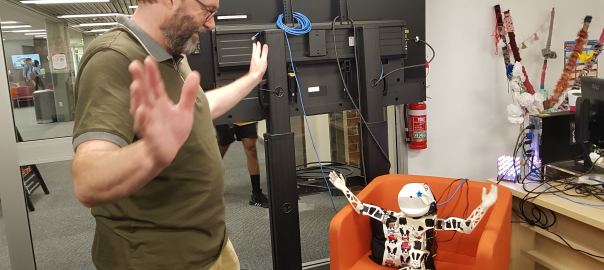Technology Versus Culture, a false dichotomy?
I was indirectly asked at the Humanities, Arts and Culture Data Summit and DARIAH Beyond Europe workshop, 27-29 March 2019, Canberra, whether the most important question /priority/importance was Technology or Culture.
Now a day and an Australian State later, I may have slightly misinterpreted the question or the intention behind it but I thought I would answer here because
- I may write about it later
- I will forget it and maybe it raises an important point or two.
I have fairly specific ideas of culture and cultural heritage and technology.
- For technology I believe it is not just manufacturing things, but also the questions, art and craft of bringing things into existence. And here I must admit to being inspired by Martin Heidegger, a problematic philosopher.
- For culture I believe it is not just the creation of cultural values, objects, events, beliefs, stories, songs etc but the passing down of these objects stories etc to future generations AND passing down the general instructions and meanings and methods to help keep active the knowledge behind transmitting and modifying these cultural objects, both tangible and intangible.
And what does technology do? It helps the passing down and preservation of these cultural objects and non-objects. I don’t separate technology and culture, because culture needs to control the art of production, of bringing things into existence and keeping them there. When culture becomes consumer production but the production is not part of the cultural life cycle of creator and community, that is where culture weakens, and we could blame that on technology, but that is because we have started thinking of technology as an impartial, neutral, scientific way things have to be. Where tangible heritage or intangible heritage is created by people and needs to be valued, preserved and appreciated by future people, technological factors are never impartial and purely scientific, because technology is there to serve people not machines.
Let me give you another example, when I talk of a digital scholarly ecosystem, digital humanities people understand what I mean, a programmer I spoke to could only think of ecosystem as supplying people with computers and other digital devices and ensuring they always had the latest model and the manufacturers could charge as much as possible to resolve for their shackled customer this perceived and designed obsolescence. That is not what I mean by a digital ecosystem because the users are continually charged with replacing and learning the device itself, they will have little time to actually build, value, communicate and preserve something.
Now I do worry that we increasingly see technology as meaning digital technology, and there are commercial and academic reasons to focus on the equipmental, because funding is more straightforward and goes through fewer people who can raise their careers and profiles. Culture does not have to employ digital technology, and we straitjacket and possibly impoverish it if we continue to think of data as only digital (data predates digital) and technology as only digital (again, techne is a concept from Ancient Greece).
However, they don’t generally make these objects and they don’t generally ensure these objects and non-objects are maintained and used. And this, I think, is a problem for digital humanities, we have few ways to value these people and the work they do and the communities they serve.
And in our session yesterday a professor said there should be a Centre of Excellence in Digital Cultural Heritage in Australia. The audience reaction was highly favorable then and in the tweets afterwards. And someone like me should surely agree, right? I have been writing and designing and teaching about digital cultural heritage for two decades. Well yes and no. I believe it should happen and come from the GLAM sector and indigenous and other local communities, because they are the best guardians and trustees.*
A Centre of Excellence will raise the profile and increase the collaboration potential of academics and academic groups, but it also implies if you are not in a Centre of Excellence you are not excellent. Is that what digital heritage should support? I think it should be bigger: a National Collaborative Research Infrastructure, or equivalent, supported and driven by the GLAM sector, perhaps helped in focus by academics. Once you have your NCRIs, build your Centre of Excellence around that. Because a Centre of Excellence of digital cultural heritage would and should be huge, it may be better to have smaller and more directed Centres of Excellence. Are there not enough humanities academics in Australia to apply for more than one?
* I see humanities as being larger than humanities academics and researchers. I believe it also includes the creators, the preservers and the audience. At humanities research infrastructure meetings we are asked what we want, but surely this is tied to the problem of what is best for Australian humanities, creators and communities?
NB thus blogpost has been modified, just to stick to the topic and will be modified again when I think of a few more qualifying statements.

